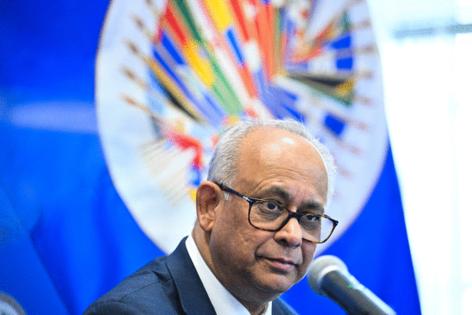US calls on UN to approve 'Gang Suppression Force' for Haiti
Published in News & Features
The Trump administration is urging the United Nations Security Council to hear the “united voices” of Latin America and Caribbean nations backing a U.S.-led plan to help Haiti’s security forces take back territory, protect critical infrastructure and dismantle criminal gangs.
Every active member nation of the Organization of American States has spoken, Barbara Feinstein, the State Department’s deputy assistant Secretary of State for Caribbean Affairs and Haiti, said Thursday at an OAS press conference in Washington. “We urge the United Nations Security Council to hear our united voices and act without delay. Haiti cannot wait,” she said. “The time for urgent coordinated action is now.”
Feinstein’s call comes as a critical deadline for the renewal of the current multinational security force approaches at the end of this month, and as gang violence continues to devastate Haiti. With communities remaining under siege, and with children now accounting for half of the more than 1.3 million people who have had to flee their homes, Haiti is in worse peril today than when the Security Council first envisioned a way to support its fight against armed gangs, Feinstein said.
“The territorial expansion of these criminals and murderers threatens to erase the hard-fought battles for national sovereignty by the under-resourced Haitian security forces,” she said. “We must come together as a region now to deliver an appropriately resourced force with the scale and scope needed to take the fight to the gangs.”
This week, 32 member states of the OAS issued a joint statement supporting efforts by the United States and Panama to field a more aggressive force into Haiti to fight the gangs. Under a draft resolution co-written by the U.S. and Panama, the current Kenya-led Multinational Security Support mission would be transitioned into a “Gang Suppression Force” with the ability to act more aggressively and independently of the Haitian national police. The force would be supported by a newly created U.N. Haiti Support Office charged with coordinating logistics and operations.
The OAS statement refrains from calling it a “Gang Suppression Force,” a reflection of concerns among members nations that they may be limiting the efforts to help Haiti return to stability by focusing solely on armed groups. Instead, the resolution leaves the decision up to the U.N., whose members will need to support the intervention, decide on its mandate and agree to pay for some of its costs out of their normal contributions under a plan proposed by Secretary-General António Guterres.
During the press conference, OAS Secretary-General Albert Ramdin said the joint statement shows the region’s solidarity on helping Haiti return to stability. With that unified support and the members’ recent endorsement of a $2.6 billion roadmap he recently unveiled to help Haiti rebuild, Ramdin said he hopes “all feel inspired to not hesitate” to help the country.
The OAS has been under pressure by the U.S. to do more to help Haiti deal with the violence or risk a losing its U.S. funding. On Thursday, Ramdin continued to stress the regional entity’s limitations in deploying a security force to Port-au-Prince.
“We don’t have that mandate, and the charter doesn’t provide for them,” he said. “We will not do anything that has something to do with command structures of peacekeeping operations as such.”
Jean Josué Pierre, Haiti’s acting representative to the OAS, told members that the transformation of the current multinational security mission led by Kenya “is not an option but a vital necessity.”
He added: “Every day of inaction allows gangs to ... expand their influence, and become more deeply entrenched in the social fabric. We do not have the luxury of waiting.”
So far, neither the U.S. nor Panama has said how much their new “Gang Suppression Force” will cost and how they expect to come up with the 5,500 personnel they’ve set as a goal. The current mission has never achieved its goal of 2,500 members, and despite endorsements from Caribbean nations, has struggled to get money and equipment.
Even among Latin American nations support for Haiti has been meager. While Guatemala and El Salvador have deployed people to the Kenya-led mission, the rest of Latin America has not. Nor have governments in the region contributed to a U.N. trust fund designed to pay for stipends, which has left Washington carrying the lion’s share of the financial burden, now close to $1 billion over the last 14 months.
Feinstein emphasized that the United States is doing its part by taking “decisive steps” to help Haiti’s security forces take on gangs. They include a $5 million reward for information leading to the arrest of gang leader Jimmy “Barbecue” Chérizier, and the designation of Viv Ansanm, the powerful gang coalition he helps lead, as a global and foreign terrorist organization.
The U.S., she added, is also “promoting accountability for criminals and those supporting terrorist gangs through indictments, arrests, sanctions armed seizures and visa and U.S. residency restrictions.”
Feinstein didn’t give details, but in recent days, Port-au-Prince’s business community has been abuzz with reports of businessmen who have had their U.S. visas suddenly canceled by the Trump administration.
_____
©2025 Miami Herald. Visit miamiherald.com. Distributed by Tribune Content Agency, LLC.







Comments